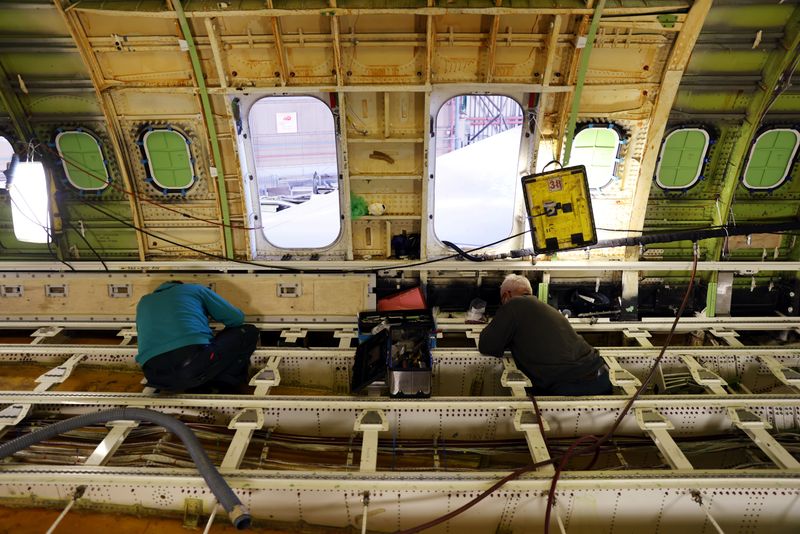By Alexander Cornwell and Jamie Freed
DUBAI (Reuters) -The strong cargo demand that helped passenger-deprived airlines stay afloat during the pandemic is showing signs of softening amid growing economic uncertainty, in part, fuelled by decades high inflation.
A potential weakening of the air freight market coincides with growing concern in the aviation industry that surging passenger traffic, which has reduced airlines' reliance on cargo revenue, may be fleeting.
The Baltic Air Freight Index, which shows weekly transactional rates for general cargo fell 8.7% last week, while the airlines group IATA said on Monday that freight revenue generated by carriers this year would fall by 6.4%.
Qatar Airways' Chief Executive Akbar Al Bakar warned on Monday that inflation was expected to weaken demand for air freight and subsequently put downward pressure on yields.
"There will be a downturn in business (activity) and when there is a downturn in business, people don't buy stuff that we normally carry as cargo," he told reporters at an industry meeting in Doha.
Edward Bell, an economist at Dubai lender Emirates NBD, described consumers and corporates as facing a "kind of vortex of price pressures" that they would increasingly be sensitive to over the rest of the year.
Korean Air Chief Executive Walter Cho said freight rates had softened but were far higher than they were before the pandemic, when there was much more capacity.
"Demand is weak especially since China is basically shut down right now. We expect it to come back soon. I expect the cargo market to be sustainable until next year at least.”
Credit Agricole (OTC:CRARY) CIB's Global Head of Asset Finance Group Jose Abramovici said the sector was likely to remain profitable for several more years given how high air freights are today.
Cathay Pacific Chief Executive Augustus Tang told Reuters cargo load factors were not as high as they had been because more air freight capacity was being added to the market.
"If there is any moderation it would be really small but the trend is still really positive," he said.
The freight market - both air and ocean - has seen rates skyrocket since the pandemic amid huge capacity cuts that have left limited available space compared to cargo being shipped.
But now that the economic outlook has turned negative, with growth slowing in China, inflation rising globally and retailers like Target (NYSE:TGT) and Walmart (NYSE:WMT) trying to dispose of excess inventory, the outlook is very different from just six months ago.
The World Bank this month slashed its global economic growth forecast by 1.2 percentage points to 2.9% for 2022 and warned many countries were likely to face recessions.
United Airlines Chief Executive Scott Kirby (NYSE:KEX) said freight rates could moderate as more capacity is added but that cargo demand would stay "really robust" due to supply chain challenges.
Emirates cargo boss Nabil Sultan, in an interview with Reuters, said rates would remain where they are for the next six to eight months given the surge in fuel prices, while demand was likely to still outstrip supply even as more capacity is being added.
However, he warned that increased operating costs, including fuel and labour, were making some routes almost unviable to operate.
Emirates is adding more freight routes into China this month in anticipation of an increase in production which has taken a hit under Beijing's zero-COVID policy.
Korean Air and Emirates are both evaluating Airbus and Boeing (NYSE:BA)'s 777x freights for new orders, their executives said.
